Title: The History of Esculent Fish
Author: Roger North
Illustrator: active 1713-1759 Eleazar Albin
Elizabeth Albin
Release date: January 17, 2021 [eBook #64319]
Most recently updated: October 18, 2024
Language: English
Credits: deaurider and the Online Distributed Proofreading Team at https://www.pgdp.net (This file was produced from images generously made available by The Internet Archive)
Transcriber’s Note: Page numbering in this book was misprinted, starting at 1 and running up to 36, before restarting at 33 on the next page. As the index refers to the incorrect page numbers, they have been retained.
[1]
Price, in Boards, One Guinea and a Half, coloured.
[2]
[3]
THE
HISTORY
OF
ESCULENT FISH,
WITH PLATES, DRAWN AND ENGRAVED BY
ELEAZAR ALBIN:
AND AN
ESSAY
ON THE
BREEDING OF FISH,
AND THE
CONSTRUCTION OF FISH-PONDS,
BY THE HONOURABLE
ROGER NORTH.
LONDON:
Printed for Edward Jeffery, Pall Mall; Robert Faulder, New Bond Street;
J. Cuthell, and J. Deighton, Holborn; J. Walker, Paternoster Row;
Hamilton and Co. Beech Street, Barbican.
MDCCXCIV.
[4]
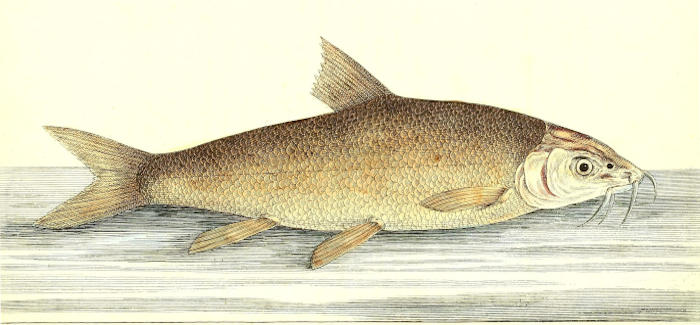
Barbus: Barbeau. A Barbell. Elizabeth Albin Depictio June 30. 1736.
[5]
Called, in Icthyology, Barbus, but by some writers in Natural History, Mustus Stuviatitis, and is a species of the Cyprinus. The Barbel is a fish commonly known and so called from the barb or beard under its chaps or nose, and is of the leather-mouthed kind.
It is but a moderate tasted fish, and the female is less esteemed for the table than the male; but neither of them is much valued: the worst season for them is in April. They love to be among the weirs, where there is a hard gravelly bottom, and generally swim together in large shoals.
In summer, they frequent the strongest and swiftest currents of water, as under deep bridges, weirs, and the like places, and are apt to get in among the piles, weeds, and other shelter; but in winter, they retire into the deepest and stillest waters; the best season for angling for this fish, is from May to August, and the time for taking them is very early in the morning, or[6] late in the evening. The place should be baited with chopped worms some time before; and no bait is so good for the hook as the spawn of fish, particularly the Salmon: in defect of these, lob-worms will do; but they must be very clean and nice, and the hook carefully covered, otherwise he will not touch them. Old cheese steeped in honey also is a fine bait.

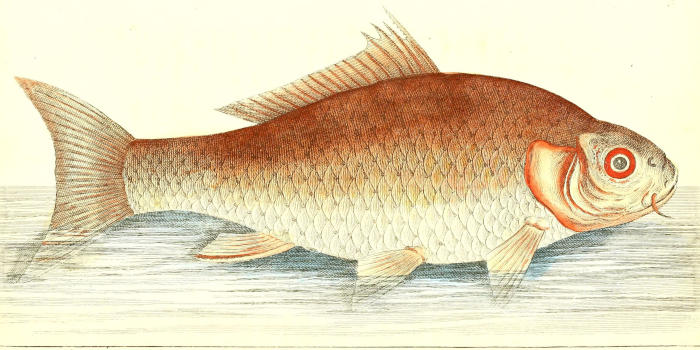
Cyprinus. Carpe. The Carp. Eleazar Albin delineavit Decem. 12. 1735.
[7]
Leonard Marchal first brought this fish into England about 1514: it is the most valuable of all kinds of fish for stocking ponds, because of its quick growth and great increase. If the feeding and breeding of this fish were more understood and practised, the advantages resulting would be very great; and a fish pond would become as valuable an article as a garden. The gentleman who has land in his own hands, may, besides furnishing his own table and supplying his friends, become a source of much profit in money, and very considerable advantage to his lands at the same time, so as to make it produce more than by any other employment whatever. The sale of Carp makes a considerable part of the revenue of the principal nobility and gentry in Prussia, Pomerania, Brandenburg, Saxony, Mecklenburgh, Bohemia, and Holstein. Particular attention should be paid to the soil, water, and situation of a Carp pond; the best kind are those which are surrounded by the finest pasture, or corn fields, with a rich black mould, and soft springs on the spot, or other running water, that is neither too cold, or impregnated with acid, calcareous, selenetic, or other seraneous, mineral particles. The water may be softened by exposing it to the air[8] or sun in a reservoir, or by forming an open channel for it some distance from the pond; they should be exposed to the influence of the sun, and sheltered from the eastern and northerly winds.
By experience, it is found convenient to have three kinds of ponds for Carp, viz. the spawning pond, the nursery, and the main pond: the first pond must be cleared of all other kind of fish, especially those of the rapacious kind, such as the perch, pike, eel, and trout; the water beetle, and also of the newts or lizards. It should be exposed to sun and air, and be supplied with soft water. A pond of one acre requires three or four male Carp, and six or eight female ones; and in the same proportion for each additional acre. The best Carp for breeding are those of five, six, or seven years old, in good health, with full scale, and fine full eyes, and a long body, without any blemish or wound: the pond should be stocked in a fine calm day, towards the end of March, or beginning of April. Carp spawn in May, June, or July, according to the warmth of the season; and for this purpose, they swim to a warm, shady, well-sheltered place, where they gently rub their bodies against the sandy ground, grass, or osiers; and by this pressure the spawn issues out at the spawning season. All sorts of fowl should be kept from the ponds: the young fry is hatched from the spawn by the genial influence of the sun, and should be left in this pond[9] through the whole summer, and even the next winter, provided the pond is deep enough to prevent their suffocation during a hard winter; then the breeders and the fry are put into ponds safer for their wintering.
The second kind of ponds are the nurseries; the young fish should be moved, in a fine calm day, into this pond, in the months of March or April: a thousand or twelve hundred of this fry may be well accommodated in a pond of an acre. When they are first put in, they should be well watched, and driven from the sides of the pond, lest they become the prey of rapacious birds. In two summers, they will grow as much as to weigh four, five, or even six pounds, and be fleshy and well tasted.
The main ponds are to put those into that measure a foot, head and tail inclusive; every square of fifteen feet is sufficient for one Carp: their growth depends on their room, and the quantity of food allowed them.
The best seasons for stocking the main ponds are spring and autumn. Carp grow for many years, and become of considerable size and weight. Mr. Foster mentions seeing in Prussia two or three hundred Carps of two and three feet in length, and one five feet long, and twenty-five pounds weight; it was supposed to be about sixty years old: Gesner mentions one that was an hundred years old. These were tame, and would come to the side of the pond to be fed, and swallowed[10] with ease a piece of bread half the size of a halfpenny loaf. Ponds should be well supplied with water during the winter; and when they are covered with ice, holes should be opened every day for the admission of fresh air, through want of which, Carps frequently perish. Carp are sometimes fed, during the colder season, in a cellar: the fish is wrapped up in a quantity of wet moss laid on a piece of a net, and then laid in to a purse; but in such a manner, however, to admit of the fish breathing: the net is then plunged into water, and hung up to the ceiling of the cellar: the dipping must at first be repeated every three or four hours, but, afterwards, it need be plunged into the water only once in six or seven hours: bread soaked in milk is sometimes given him in small quantities; in a short time, the fish will bear more, and grow fat by this treatment. Many have been kept alive, breathing nothing but air in this way, several successive days.

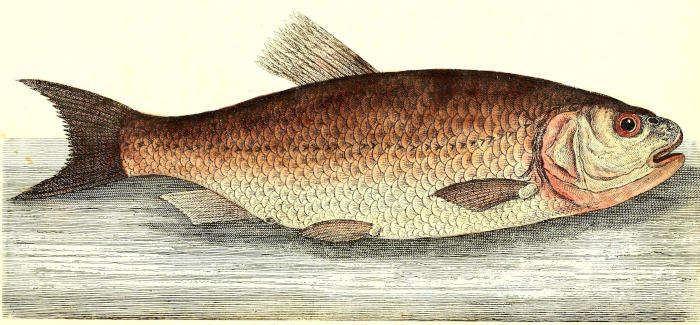
Cephalus. The Chub. Fortin. Albin delin. 1740.
[11]
Is, according to the Artedian and Linnæan system, a species of Cyprinus, and is called by the French the Vilian and Testard, and was called by the ancient Romans Squalus. The resorts of this fish are easily found; being generally holes over-shaded by trees; and on a hot day, they may be seen in great numbers, floating almost on the surface of the water. For the table they are very poor fish, full of bones. They afford much entertainment to the angler, and are easily caught. The best manner of fishing for them is thus: prepare a very strong rod of sufficient length; fix a grashopper to the hook; place yourself so as not to be perceived by the fish, and drop in the bait about two feet from the place where a Chub lies; if he does not see the angler, he rarely fails biting, and is taken directly; but he is so strong a fish, that he should be taken out carefully, after a great deal of play, otherwise the tackle will be in danger; a beetle, or any large fly, will answer the purpose in the place of a grashopper; and if none of them are to be had, the method of fishing must be altered, and the line be long enough for fishing at the bottom.
In March and April, this fish is to be caught with red worms; in June and July, with worms, snails, and cherries;[12] but in August and September, the proper bait is good cheese, pounded in a mortar with some saffron and a little butter. Some make paste of cheese and Venice turpentine for the Chub in winter, at which season the fish is better than at any other; the bones are less troublesome in this season, and the flesh more firm and better tasted. The roe is also generally well flavoured. The angler must keep his bait for this fish at the bottom in cold weather, and near the top in hot. The fish will bite easily.

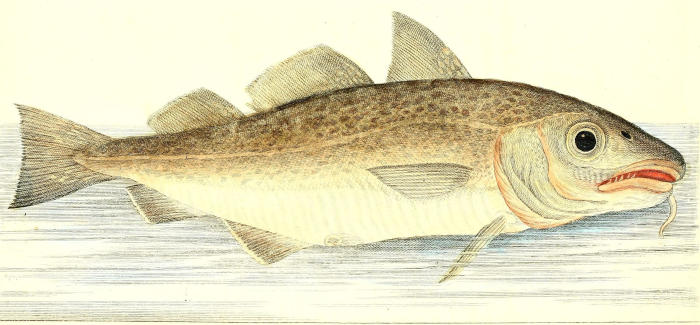
Asellus Major. The Cod-fish. E. Albin Delin: March 29. 1739.
[13]
Is the largest of the genus Aselli, by authors called Asellus Maximus, and sometimes Asellus Varius, five Striatus. It is distinguished from other fishes of the same kind by the following marks. Its colour on the back and sides is a dusky olive, intermixed with yellow spots; a white belly, with a white line running along each side from the gills to the tail, which is curved at the abdomen, but straight elsewhere. It has very small scales, which adhere firmly to the skin; its eyes are large; a single beard hangs at the angle of its lower jaw, which is short, seldom longer than one’s finger. It has a broad tongue, and several rows of teeth, one being much longer than the rest. Among these there are some moveable teeth, as in the Pike; and in the palate, near the orifice of the stomach, and near the gills, it has small clusters of teeth; it has three back-fins, two at the gills, two at the breast, and two at the anus; and the tail is plain.

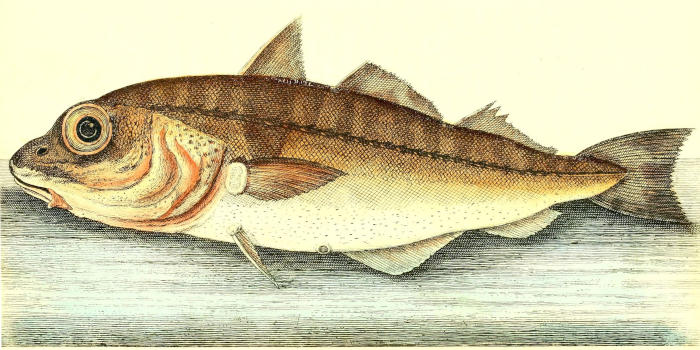
Asellus Minor. The Haddock. Fortin. Albin delin. 1740.
[14]
Is, according to the Artedian system, of the genus of Gadi. It is called by Salvian the Asellus Major, or Greater Asellus, and by Turner and Willoughby the Orus, or Asinus of the Ancients. Charlton tells us, that it was the Callaris Galeris, or Galaxis, of the old Romans, mentioned by Pliny; but Artedi has some doubt about that. It is likewise called by Artedi the Gadus; with a bearded mouth, three fins on the back, a whitish body, with the upper jaw longest; the tail a little forked. Large Haddocks begin to be in roe about the middle of November, and continue so till the end of January; from that time till May, their tails grow thin, and they are out of season.
The small ones are very good from May to February; and those which are not old enough to breed in February, March, and April. It is said by fishermen, that in rough weather they hide themselves in the sand at the bottom of the sea, and among the ooze, and shelter themselves till the storm is over, because they take none in stormy weather. They live in the summer on young Herrings, and on other young fish; and in winter, on a species of sespula, called the stone-coated Worm, and by the fishermen, Haddock-meat. The great shoals of[15] Haddocks come periodically on the coast of Yorkshire. The large ones quit the coast as soon as they get out of season, and leave behind them a number of small ones. They are said to visit the coasts of Hamburgh and Jutland in the summer. There is a large black spot on each side of the Haddock, ascribed by superstition to the mark which St. Peter’s thumb made, when he took the tribute money out of the mouth of a species of this fish.
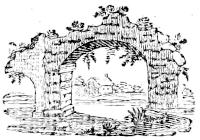
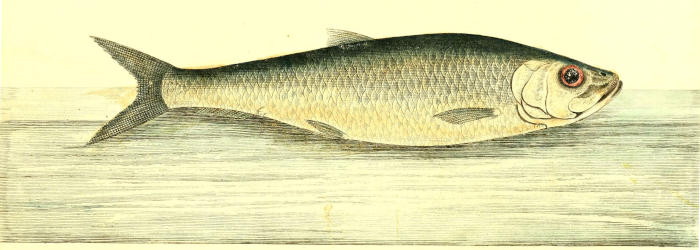
Halec. The Herring. E. Albin Del: 1739.
[16]
Harengus, in Icthyology, a species of the Clopea. Its Harengi forms are these: its length is generally seven or eight inches, though it sometimes grows to a foot; its head is flatted, and its mouth placed upwards: it has a green back and sides mingled with blue, and a belly of a silver cast; its scales are large and round. It is not spotted at all, and its belly is carinated; the ridge is quite smooth, and not at all serrated; its side lines are small, and scarce distinguishable; the lower jaw is stronger and more prominent than the upper; its gills are four in number, as in other fishes; their fibres very long, and open remarkably wide; so that this fish dies almost as soon as taken out of the water: it has one fin on its back, which consists of about seventeen rays, and is between the head and the tail; the two ventral fins have nine rays, the pectoral seventeen, and the anal fourteen; the tail is forked. The name Herring, takes its derivation from the German Heer, an army, which expresses their number when they migrate our seas. Herrings are found in vast quantities from the highest northern latitudes as low as the northern coast in France; on the coast of America large shoals of them are to be met with as low as Carolina. In Kamtschatka they are[17] also to be found, and very possibly in Japan: their winter rendezvous is within the arctic circle; they retire there after spawning, and wherever they can meet with insect food. They are in full roe at the end of June, and in perfection till the commencement of winter, when they begin to deposit their spawn.
Various are the names given to them, and according as they are ordered: as,
1st. Sea-Sticks are what are caught all the fishing season, and but once packed. A barrel of these contains six or eight hundred; according to law, eight barrels go to the hundred. A hundred of Herrings is one hundred and twenty; a last is ten thousand; and they generally reckon fourteen barrels to the last.
2d. Repacked Herrings are Herrings repacked on shore. Seventeen barrels of Sea-Sticks make from twelve to fourteen barrels of repacked Herrings. They repack them in the following manner: take out the Herrings, wash them in their own pickle, and lay them orderly in a fresh barrel: they have no salt put to them; but after being close packed, have a sworn copper put over them with the pickle when the barrel is[18] half full: the pickle is brine; so strong that the herring may swim in it.
3d. Summers are what are caught by the Dutch Chasers, or Divers, from June till the middle of July. They are sold in Sea-Sticks; they will not endure repacking: they go one with another full and shotten; but the repacked Herrings are sorted.
4th. The Sick and Shotten Herrings by themselves; the barrel should be marked.
5th. Cruss Herrings are what are caught after the middle of September; they are cured with salt upon Salt: all these are full Herrings.
There is likewise another sort, called Cowed Herrings. These serve to make Red Herrings from September to October; they should be carried on shore within a week after they are taken; they are roed in salt, but never gipped; those which they make Red Herrings of, are washed in fresh water previous to their being hung up in the Herring-Houses, generally known by the appellation of Herring-Hangs.
Then followeth the manner of salting Herrings. When the[19] fishes are taken out of the nets and put into the warbacks which stand on the side of the vessel, one fills the gipper’s baskets. The gippers, after having cut their throats and taken out their guts, proceed to sort them. When the gipped are put into the basket, one man takes it to the rowerback, wherein there is salt; one stirs them about in the salt, whilst another takes them from him, and carries them in baskets to the packers. Each barrel is packed by four men, who lay the Herrings one by one in a very even manner; which barrel being full, another man takes it from them. The barrel is usually left to stand open for a day or two, to dissolve the salt; afterwards it is filled up, and the barrel is headed. Observe, that the pickle be strong enough to sustain the fish; otherwise they will decay in it.
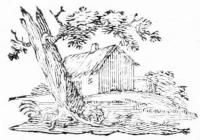
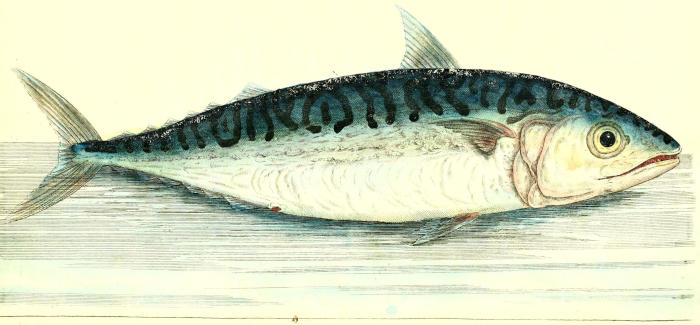
Scombrus. Maquereau. a Mackarel. Eleaz. Albin del: May 3. 1739.
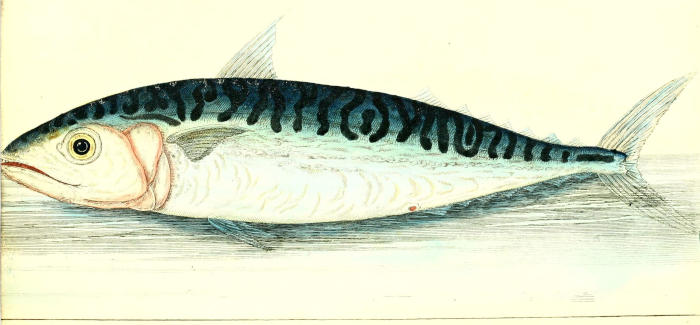
Scombrus. Maquereau. a Mackarel. Eleazar Albin delinavit. July 21. 1735.
[20]
A very common sea fish of the Schomber kind. Its nose is sharp pointed and tapered; its eyes large; and both its jaws of the same length: the teeth are small, but very numerous; the body compressed on the sides; towards the tail, it is rather slender, and somewhat angular. The first dorsal fin is placed a little behind the pectoral fin; it is triangular, and has nine or ten stiff rays; the second has twelve soft rays, and lies at a distance from the other; the pectoral has twenty, and the ventral six rays: at the base of the anal fin, is a long spine. Betwixt the last dorsal and the tail, are five small fins; the same number, likewise, betwixt the anal and the tail. The tail is broad and semilunar; the colour of the back and sides above the lateral line is beautiful green, variegated with black lines pointing downwards; beneath the line, the belly is of a beautiful silvery colour. The eyes of the Mackarel are almost covered with a white film, which grows in winter, during which time they are nearly blind: they cast it in the beginning of summer.
It is in high estimation amongst the Romans, because it furnished the precious garum.
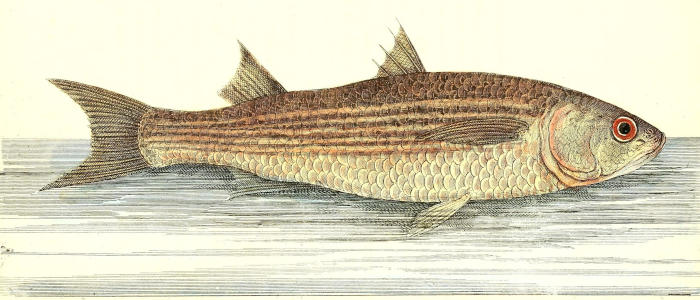
Mullus. the Mullet. Eleaz. Albin Delin. 1739.
[21]
Is a name given indeterminately to fish of several kinds; but the true meaning of the word is the same with that of the Mugil, or Cephalus. The characters of the Mugil are these. The branchiostege membrane on each side contains six crooked bones; the upper one being the broadest, and hid under the gills; only five are discernible; the scales are large, and cover the head and the opercula of the gills, as well as the body of the fish. The head is depressed in the anterior part; the body oblong and compressed. According to these distinctions, there is only one species of Mugil, namely, the Mugil of Ovid and the Ancients. It resembles the Thymallus in its external figure; its jaws are tender and thin, and have no teeth in them; the tail is forked. The Linnæan system reckons two species; viz. the Cephalus and Albula.
Three or four different species of the Mugil have been described by Rondeletius and others; but their difference seems to arise merely from age, place, and the like accidents.
The nose is sharp, the belly bowed; the head plain and flatted; the scales are very large, and cover the body entirely. The back is of a dusky blue, or greenish-brown colour; the belly white, and the sides variegated, from the head to the[22] tail, with green and black lines; its tongue is rather rough; it has no teeth. It preys upon no fish, and is therefore supposed to feed on weeds. At certain times it comes up the river, but it is generally caught at sea.
The Mullet is a very good tasted fish; we make tobago of its spawn.
Mullets are to be found chiefly on the sandy coasts; particularly where there are influxes of fresh water. They come in great shoals; and they keep rooting the mud like hogs, and leave their trace in the form of large round holes.
They are very cunning; and when surrounded with a net, the whole shoal frequently escape by leaping over it; for if one takes the lead, the others are sure to follow.
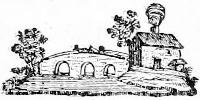
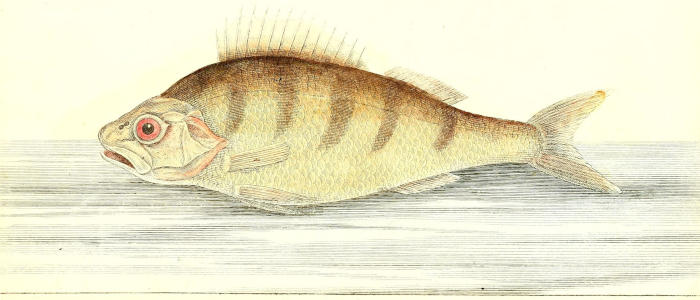
Perca. Perche. A Pearch. Eleazar Albin Del. July 8. 1736.
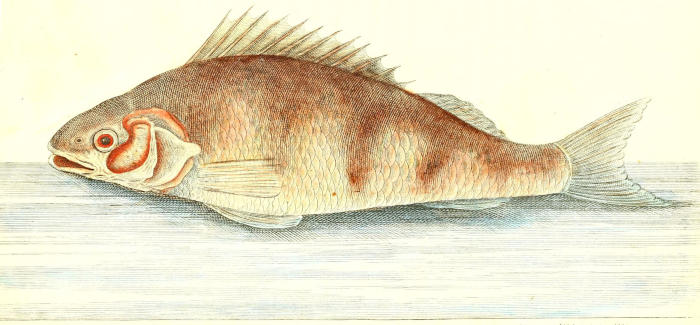
The Pearch from the River Rhine. Eleaz. Albin del: May 1. 1739.
[23]
Is a genus of fish of the order of Thoracci; the characters of these are, that the membrane of the gills has seven bones, and the back has one or two fins; the first spiny, and the second soft: the body is covered with rough scales; the edges of the gill-covers are scaly and serrated. Linnæus enumerates thirty-six species; this fish is variegated with black spots.
There is a strange variety of Pearch; some of which are quite hunched; and the backbone, near to the tail, very much distorted: in colour and other respects, it is similar to the common kind.
The best time for their biting is betwixt spring and summer, as at that time they are very greedy; and the angler, with good management, may take all that are in the hole, at one standing, if there were ever so many. The Pearch will bite all day long, if it be cloudy; but the best time is from eight till ten in the morning, and from three till six in the afternoon. It is very abstemious in the winter, and will seldom bite; if it does at all, it is in the middle of the day. All fish bite best at this time of the day in that season.
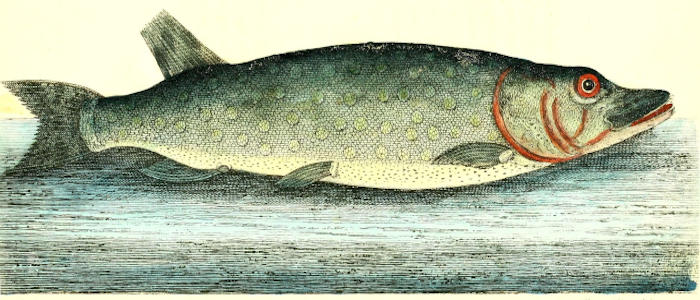
Lucius. The Pike or Jack. Eliza. Albin delin. 1740.
[24]
Is the Lucius Esox of Linnæus. It has a very flat head; the upper jaw is broad, and shorter than the lower, which turns up a little at the end; the body is long, slender, and compressed sideways; the teeth are very sharp, disposed only in the front of the upper jaw, but in both sides of the lower; sometimes in the roof of the mouth, and frequently in the tongue.
The eyes are small, and the slit of the mouth very wide; the dorsal fin is placed very low on the back, and consists of twenty-one rays; the pectoral of fifteen, the ventral of eleven, and the anal, of eighteen; the tail is bifurcated.
They are to be found in most of the lakes in Europe. Lapland produces very large ones, some eight feet long; they are dried there, and exported for sale.
The Pike was introduced into England in the reign of Henry VIII. in 1537, when a Pike was sold for double the price of a house lamb in February. Besides its usual food, fish and frogs, it devours water-rats and young ducks. It is remarkable for its longevity: we read of one that lived till ninety years old, and of another that was no less than two hundred and seventy years old.
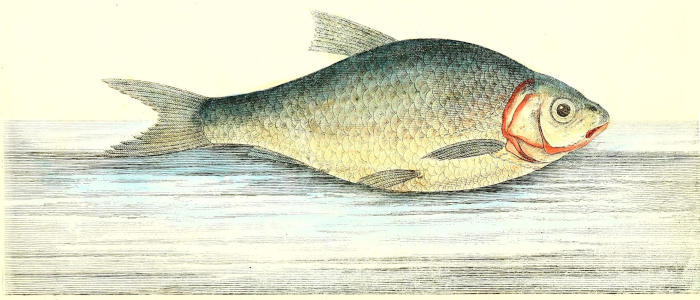
Rubellio. The Roach. E. Albin Del: 1739.
[25]
Is the English name of a very common fish, called by some authors the Rutilius and Rubiculus, and by others the Rubellio. It is a species of the Cyprinus, according to the new system of Artedi, and the Cyprinus Rutilius of Linnæus. It has been looked upon (though without much reason) remarkable for its liveliness and vivacity, from which comes the proverb “sound as a Roach.” In some parts of the world, this fish will only live in standing waters: it thrives very much in ponds and deep, still rivers: it is very remarkable for its progeny; a pond being sooner stocked with this fish than any other.
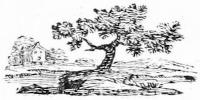
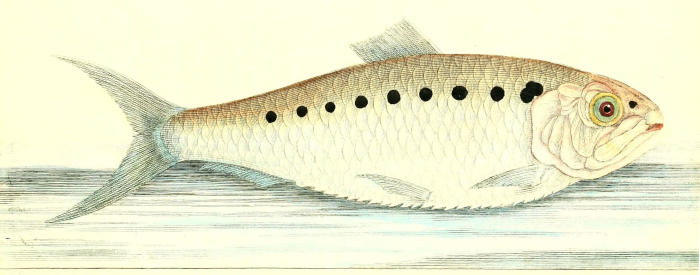
Clupea: Halachie. A Shad. Eleazar Albin Del. June 30. 1736.
[26]
Is the name of a sea fish of the Herring kind; it is also called the Mother of Herrings; by some authors Clupea and Trissa; by the Ancients Trechis, or Trichias; and the Clupea Alosa of Linnæus. In its general form, it very much resembles the Herring; only it is flatter and broader, and grows to a cubit long and four inches broad. The back is convex and rather sharp; the head sloping considerably from it. The body grows gradually less to the tail from thence. The lower jaw is rather longer than the upper; the teeth very minute. The dorsal fin is small, and placed very near the center: the middle rays are the longest. The pectoral and ventral fins are small; the belly very sharp; the tail forked: the body is of a dusky blue. Above the gills is a line of black spots, which mark the upper part of the back on each side. The number of these spots is different in different fish, from four to ten.
It is very common in many of our seas, and in some of our rivers which lie near the sea. They run up there in great numbers, and are then very fat; they afterwards become lean, and go down to the sea again. They usually swim in large shoals together.
[27]
The Shad is in higher perfection in the Severn than in any other river in Great Britain. It appears there in May, and in very warm seasons, in April; it continues about two months. At its first appearance, it is esteemed a very delicate fish; especially at Gloucester, where it sells dearer than Salmon. The London fishmongers distinguish it from that of the Thames by the French name of Alose. Whether they spawn in the Severn and Wye, is not determined, as their fry has not yet been ascertained. The old fish come from the sea in full roe.
The fishermen imagine, very erroneously, that the Bleak, which appear in multitudes near Gloucester in the months of July and August, are the fry of the Shad: many of these are taken in those months only; but none of the emaciated Shad are ever caught in their return.
The Thames Shad does not frequent the river till the month of July, and is thought a very coarse, insipid fish. At that time, the Twaite, a variety of Shad which makes its appearance in Gloucester, and is taken in great numbers in the Severn, but held in as great disrepute as the Shad of the Thames. The real Shad weighs sometimes eight pounds; but in general from four to five. The Twaite, on the contrary, weighs from half a pound to two pounds, which it never exceeds. It only differs from the small Shad, by having one or more black spots on its side, which are generally placed one under the other.
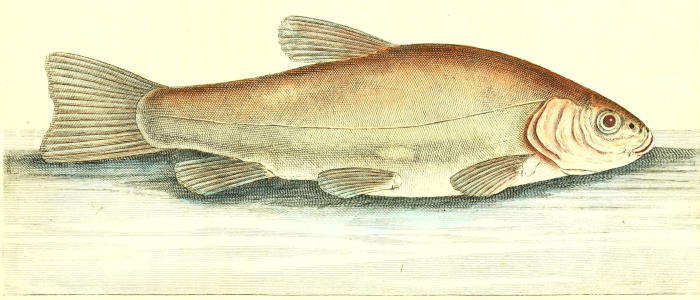
Tinca: Tenche: A Tench. Eliza. Albin Delin. May 27. 1737.
[28]
Is, in Icthyology, the English name of the Tinca of the modern authors; but, according to the Artedian and Linnæan system, a species of the Cyprinus. It is distinguished by Artedi by the name of the blackish, mucous, or slimy Cyprinus, with the end of the tail even.
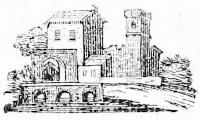
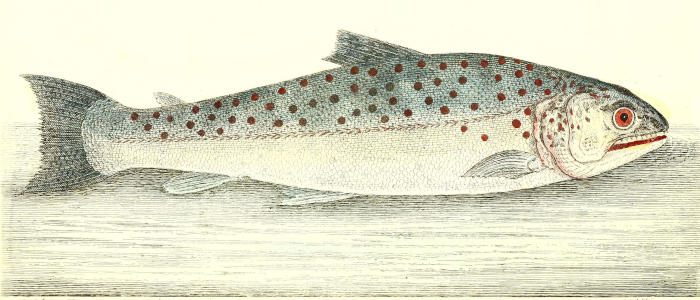
A Salmon Trout from Berwick on Tweed E. Albin 1740.
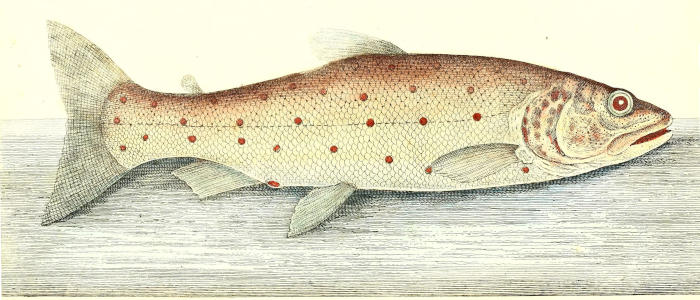
Trocta, the Trout. Albin Fecit, 1741.
[29]
Is a very valuable river-fish; the characters of which are these. It has a long body; its head is short and round, its nose blunt at the end: its tail is very broad; its mouth large, and each jaw furnished with one row of sharp teeth. In its palate there are three parcels of teeth, each of an oblong figure, in the congeries, and all meeting in an angle near the end of the nose; the tongue has also six, eight, or ten teeth on it. It is very beautifully variegated on the sides with red spots. The colour of the Trout, and of its spots, varies greatly in different waters and different seasons; yet you may reduce each to one species.
In Llyndivi (a lake in South Wales), there are Trouts called Coch y Dail, marked with red and black spots about the size of a sixpence; others, not spotted, and of a reddish hue, which sometimes weigh from eight to ten pounds: they are very ill tasted. In Lough Neagh, in Ireland, there are Trouts called Buddagh, many of which weigh thirty pounds; others are taken of a much superior size, in Hulse Water (a lake in Cumberland), the same as those Trouts in the lakes of Geneva.
The stomachs of the common Trouts are very thick and muscular, as they feed on the shell fish of lakes and rivers as well as the small fish; and take gravel or stones into their[30] stomachs to assist in comminuting the testaceous parts of their food. The Trouts of certain lakes in Ireland are remarkable for the great thickness of their stomachs, which, from some resemblance to the digesting organs in birds, are called Gizzards; and the species which have them, are called Gizzard Trouts. These stomachs are frequently served up to the table in Ireland, under the nomination of Gizzards.
Trouts are a very voracious fish, affording the angler great amusement. The under jaw of the Trout is subject to the same curvature as that of the Salmon. There is likewise a species of Trout, which migrates out of the sea into the river Esk in Cumberland, from July to September, and called, from its colour, the Whiting. Its taste is delicious. When they first make their appearance from the salt water, they have a Salmon Louse adhering to them. They have milt and spawn; but no fry has been yet observed. It goes under the appellation of Phinocs, among the Scotch. They are never more than a foot in length; the upper jaw is somewhat longer than the lower; the upper contains two rows of teeth, and the lower one: on the tongue there are six teeth. Its form is truly elegant; the colour dusky, mingled with silver. First dorsal fin spotted with black; the tail quite black, and forked; the first dorsal fin has eleven rays; the pectoral thirteen; the ventral nine; the anal nine.
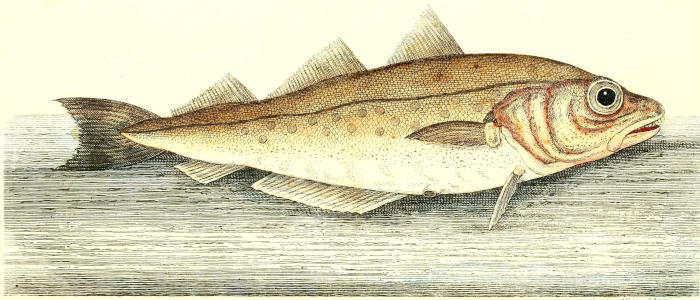
Asellus. The Whiting. Fortin. Albin. delin. 1740
[31]
Is, in Icthyology, the English name of a common fish of the Asellus kind, called by some Asellus Mollis, and by others Asellus Albus, or Merlangus. It is certainly, according to the Artedian system, one of the Gadi; distinguished by that author by the name of Gadus with three fins on the back; without beards, with a white body; the upper jaw longer than the lower.
The Whiting, or Gadus Melangus of Linnæus, has a very elegant form: its eyes are large, its nose sharp; the teeth of the upper jaw are very long, and appear above the lower when closed. The first dorsal fin has fifteen rays, the second eighteen, and the last twenty. The head and back are of a pale brown colour; the lateral line white and crooked; the belly and sides silvery; the sides being marked lengthways with yellow.
They appear in the sea, by large shoals, in the spring, keeping at the distance of about half a mile to that of three miles from the shore. They are the most delicate and wholesome of any of the genus, and seldom grow to more than ten or twelve inches in length.
[32]
[33]
A
DISCOURSE
OF
FISH AND FISH-PONDS,
BY
The Hon. ROGER NORTH.
[34]
[35]
One great point in the conduct of fish, is, to have them at command; another is, to have perpetual recruits, to supply your stock as you draw it off. This is not to be done without a certain order and method; and with it, nothing is more practicable and easy.
Your method must be, to have some great waters, which are the head-quarters of the fish, from whence you may take, or wherein you may put, any ordinary quantity of fish. Then to have stews, and other proper auxiliary waters, so as you lead the fish from one to the other, whereby you never shall want, and need not abound; and, which is more, lose no time in the growth of the fish, but employ the water, as you do your land, to the best advantage.
This will appear more distinctly in the sequel of this discourse, which shall begin with the situation and disposition of the principal waters, whereupon you must depend for the raising and feeding the greatest part of the stock.
First, you must examine the grounds, and find some fall betwixt[36] two hills, as near a flat as may be, so as there be a sufficient current for the water. If there be any difficulty in judging of such, take an opportunity after some sudden rain, or the breaking up of a great snow in winter, and you shall see plainly which way the ground casts; for the water will take the true fall, and run accordingly.
The condition of the place must determine the quantity of ground to be covered with water. I should propose in all, fifteen acres in three ponds, or eight acres in two, and not less. And these ponds should be placed one above another, so as the point of the lower may almost reach the head or bank of the upper; which will be very beautiful, as well as profitable, as will appear afterwards.
The head or bank, which, by stopping the water in its current, is to raise the water, and so make a pond, must be built with the clay and earth taken from the pan or hollow dug in the lowest ground above the bank; and that pan should be shaped as half an oval, whereof the flat comes to the bank, and the longer diameter runs square from it.
But were there not need of earth for this purpose, it were better to leave the natural soil for the fish to feed upon. I shall give the reason afterwards, and consider the manner of raising and fortifying the bank particularly.
[33]
It is obvious, that if you make a dam cross a valley or swamp, where at any time after, the water runs, it will produce a pond; and as the bank or dam is higher at the point or center, which is against the lowest ground, so much is the pond deeper; and if the hills on each side rise steep and quick, the water stopped will cover less ground than if they rise slow.
Now first, for making the bank or head, you must be sure it is tight, and that it do not sew or leak, as it will certainly do, if it be composed of mere earth; therefore a bed or wall of clay, the whole length of the bank, must be carried up with good ramming, from a foot or two below the surface of the ground, to such height as you propose the water shall stand.
If you do not give the bed of clay this foundation, the water lying under a great weight from the depth of it, will work itself underneath, so allow a spit or two at least for it. Then, as you ram the clay, you must be sure that earth be brought to carry the bank up with it, or else the sun will search and crack it, which is of pernicious consequence; so when it is come to its full height, close and cover it with earth immediately, lest the inconvenience happens.
You must allow three feet to the breadth of this bed of clay, and raise it to the height you intend the water shall stand, and lay earth three feet higher; two feet would have served, but that the allowance of one at least must be made for the[34] sinking of the bank; for it will do so notwithstanding the pressing of tumbrels, horses, and men working upon it.
If you project many stews, or other ponds to be sunk right down about the same time, you will have great advantage by the clay you take out of them, which will be much more than is necessary for the bed, and that may fortify the bed, by being pressed down by the tumbrels on each side of it; and so the bank will be very much confirmed, and it will also save breaking of ground within the pond, which is a great advantage in the feed of the fish.
The dimensions of these banks are governed by the manner of the hills rising; for if it be quick, then, to cover a competent quantity of ground, you must raise the bank higher, and consequently it must be made stronger, than when the ground riseth slow, so as a moderate height shall cast the water upon ground enough. And of this there will be great difference; for in some places, ten feet high shall cover as much as twenty feet in others. And this will be easily discovered by the water-level, used according to art, whereby you may stake the water-line upon the ground to any height; and so you will fix the determinate height of the bank.
[35]
I will suppose a medium, and that a bank, fourteen feet high at the center, will cover the quantity of ground. Then you must make your bank at the foot at least fifty feet wide, and so straitening by equal degrees on either side, bring it to sixteen at the top; and so you will have a sufficient slope, and the bank will stand firm and durable, scarce to be destroyed without as much pains and industry as made it.
By this proportion, pond heads of any dimension may be projected; the matter is not so nicely circumstanced, that a little more or less should signify. But it must be noted, that to make them too slight, is the greatest error, and most to be avoided; let them be rather made too strong, for then you have not only a more secure bank, but a more beautiful walk, and more room for wheel-carriage, besides a capacity of some wood; all which compensate the charge of what is superfluous.
If the bank be well made, and in sufficient dimension, nothing can hurt it, but great land-floods, or water-shots, which, if suffered to run over the bank, will carry away the fish, which in a warm flood will rise, and go with it to seek adventures, but also gurry holes in the back of the bank, and weaken it so[36] much, that if the flood continues, it shall carry all away together.
For preventing of this mischief, there are two ways; 1. Grates at each end of the bank, planted upon the level that is to be the highest of the water. 2. Channels of diversion, which being taken so high in the current as may lead the water upon the side of either hill above the bank, you have the power to turn out all the water when you please, so that none shall come upon the bank.
1. As to grates, the way of them is well known; however observe, that if they be made of wood, the banks must be set diagonally, like window-bars; for so rubbish stops least against them, and the water passeth freely. And in regard you cannot allow any great distance between them for keeping in the fish, you must help out the room by extending the grate from each side of the cut in the bank where the water is to vent, some considerable space from the bank, and there to meet in a point, forming a triangle upon the bank. Here are many more slits for the water to vent at, than if the grate lay flat upon the bank, covering the passage only. And if need be, there may be doors to slide up and down, made in the grate, to let the water pass more freely; but this endangereth losing the fish. If you will afford iron for these grates, you need only cover the passage of the bank; for the bars need not be so thick, but there will be space enough for the water to vent at.
2. The channels for diverting the water are very useful in this and many other respects; for they give you a perfect[37] command of the water, and you may turn it which way you please, so as to fill or keep dry any of the ponds, and in a wet season are a perfect security. These should be made four feet wide, and on each side of the ponds the loss of ground is not considerable; for wood growing there will make amends for it.
The string of ponds in Hyde-Park are admirably disposed in this respect; for the current of the valley is carried along by the side of all the ponds, and may be let into any of them, or any may be emptied into it; than which, there is not a greater command of water.
However carefully a bank is made, it is probable it will sew a little at first; but this should be no discouragement; for by the settling of the earth, it will continually grow higher, and in a few years, if made with tolerable care, be as firm as a rock.
These are very requisite to the good command of a water, and though very ordinarily used, yet require an experienced carpenter to make and fix them as should be, especially in great waters; and such as have not experience, shall err most grossly in this work. They must be framed so as to stand firm, that[38] the force of any thrust, or a boat’s running against them, may do no prejudice to them: for if they are any thing strained, they are apt to prove leaky; and in so great an height as is needful for deep waters, a small matter will do it, unless they are extraordinarily well abutted.
The timber-work must be heart of oak, especially the top, and that all of one piece, how long soever it be; and the vent hole must be guarded with large boxes perforated so as the water, but no fish, may pass. And all this well framed, and what is under ground extraordinarily rammed with clay, else it will be apt to leak.
The use of these is very great: for if a great water must be emptied, you must either apply engines, cut the bank, or draw a sluice. As for engines, they are too chargeable, and puzzling to fix; however, I may propose to them that are lovers of art, some facile ways of lifting great quantities of water. Then, if you cut the bank, the passage is interrupted and made troublesome by the earth, and you shall scarce ram it up so well again, but it will perpetually leak about the place where the fissure was; but sluices vent the water certainly, though slowly, without any labour, charge, or inconvenience.
[39]
Now, as for the manner of raising this bank, which I think is the only chargeable work you have, I shall give some light into the way of working, so as to abridge the expence as much as may be. The advantage of trades, is, that by continual experience, they find nearer ways of doing things, spending fewer strokes, and less time, than others can. And in the conduct of this work, there is much to be saved; every man’s reason leads him to contrive compendiums of business, as I have done in the disposition of my waters; which experience of mine may save others the thought, as well as loss by making their own experiments.
When you have projected your work, for which the latter end of June, or the beginning of May, is the best time, take the assistance of your neighbours, and provide yourself with six tumbrels, four good horses, and two stout labourers, besides the driver to each pair of tumbrels. I call them pairs, because they work alternately with the same horses; so that one is filling, while the other is moving, and your labourers, as well as horses, are always at work.
The first work to be done, is, the taking up the first spit of earth where the bank is to be, and from the pan of the pond, and to lay it by for the uses I shall declare hereafter.
Then lay down your sluice, with trunks sufficient to convey[40] the water through the head or bank. This must be done at the deepest part of the ground, which probably will fall in the center of the bank. This will employ two pair of tumbrels and four labourers, for digging and fetching of clay, besides four labourers to ram it, which must be, as was said, very well done. And the carpenter, who beforehand hath fitted his work, must attend also one whole day to help in the laying it down, and to see it well rammed.
The next day’s work may be the employment of two pair of tumbrels in fetching of clay, and four or five good labourers to ram the foundation of the bed of clay. And I suppose this may rise a foot in one whole day’s work, more or less, as the length of the head is. Clay riseth stiff, and for that, if it riseth near, as in the pan of the pond, three labourers to a pair of tumbrels, are requisite to dig and fill, otherwise the horses will be idle, and want work as well as the rammers.
The day after employ four pair of tumbrels more, to fetch earth out of the pan of the pond to lay along the bank on each side of the bed of clay, the whole length of the head; and to this work, two labourers for a pair of tumbrels are enough.
Here you must lay on six labourers at least, to ram the bed of clay, and spread earth upon the bank, so that it may be done as fast as the six tumbrels supply it; and by this means the bank and bed of clay will rise together.
Thus you proceed till the bank is finished, which will rise faster as you come nearer the top, and so will somewhat alter the employment of the tumbrels and men, which you must conform in proportion accordingly. And observing these[41] directions, you may make two ponds in one month (supposing the weather propitious), which shall be three, four, or five acres apiece, as the ground gives, and not expend in money above eighty pounds, although you pay for every hour’s work of man and horse.
But considering that a gentleman is supposed to intend this business, not only as a care, but an entertainment, he will not suffer his own servants and horses to be without a share of it; and then I cannot imagine which way he can expend above sixty pounds, supposing labourers work for twelve pence per day, which I cannot say they will do in all countries.
The third pond may be a work of another year; and if the ground lies fair for it, that is, much upon a level, I would not be without it; for it will add much to the ornament of your estate, because it will fill up a range or string of waters, which two do not; and besides contribute vastly to the increase of fish, as I shall shew; and I press this thing the rather, because without it, in the method I propose, you will have the use of but one pond as to water every year. Nay, were not œconomy, and saving charge, one great branch of my design, I should recommend more of these waters, if the place will receive them.
And to demonstrate the charge is not so very great, compared with the other expences gentlemen are at for their diversion, without any return of profit, as to deter any from undertaking this particular work; I must remember, that once, at the command of my Lord North, I did, as I have directed, proceed to the making one great pond, and one stew, at Catledge,[42] which are still to be seen, but neglected; and besides, the regard to profit by the fish they would maintain and supply, the very ornament of them was worth the charge. I was limited to ten pounds, besides the work of his lordship’s horses, which I compute to be four pounds more; so the whole did not cost fifteen pounds, and yet a full acre of ground lay under water, and all was completed in twelve days. His lordship would not allow the laying down a sluice, else that water was a specimen of my proposition, as well for the conduct, as the charge of the work.
As a great garrison must have many subservient forts and redoubts dispersed about the place, for securing the country, and collecting the contributions, which are to maintain the head-quarters; so the great ponds, which are the head-quarters of the fish, must be accommodated with many other subservient waters, which I call auxiliary, because they serve to relieve the greater when over stocked, to supply them when under stocked, and to rear up and maintain fry and young stores, as well as to render the fish easy to be taken; without which conveniences, you will have but a sorry account of the fish.
[43]
There are stews, moats, and ordinary ponds dispersed about in your estate and neighbourhood; the employment of which being very considerable in the well ordering of fish, I will consider each apart; and first, of stews.
The peculiar use of these, is, to maintain fish for the daily use of your house and friends, whereby you may with little trouble, and at any time, take out all or any fish they contain; therefore it is good to place them in some inclosed grounds near the chief mansion-house. Some recess in a garden is very proper, because the fish are fenced from robbers, and your journey to them is short and easy, and your eye will be often upon them, which will conduce to their being well kept, and they will be an ornament to the walks.
If you have two great waters of three or four acres apiece, I do advise, that you be not without four stews, of two rods wide and three rods long apiece. The way of making these, is, by cutting the sides down somewhat sloping, and carrying the bottom in a perpetual decline from end to end, so as you may have a convenient mouth, such as horse-ponds usually have, for taking out your nets when you draw for fish.
[44]
If you have ground enough, it is better to make a mouth at both ends, and the deepest part in the middle; for so you may draw your nets backwards and forwards, losing less time, and the fish will not have such shelter, as the depth under a head will be. Besides this, you will find the fish will delight themselves in coming upon the shoals, and it may be, thrive better. But for this manner you must allow at least a rod of ground in length more than for the other.
These I intend for carps chiefly, though not absolutely; and if you find the tench and perch increase and prosper, you may make other lesser stews to accommodate them apart, if you please; and so you will have them at command, without disturbing the other fish; only observe this by the way, that perch will scarce live in stews and small waters, if the weather be hot, but will pine, grow lean and thin, if not die; therefore the stews are to be their winter-quarters; from whence you take them for the use of your table, but in summer translate them to the greater ponds.
These stews being designed at the same time you raise the pond-heads, will be done almost under the same charge, as is hinted elsewhere: and once made, you have the fish at a minute’s warning ready for the kettle, or any other use; which convenience is the great end of all the charge and pains, and without it, you are not a master of fish.
[45]
These were made ordinarily for securing of dwelling houses, rather than for fish; and since wars have been less frequent, or rather, grown so much an art, that the ancient way of fortifying is not useful, are almost disused. For being laid so near the dwelling, as we observe commonly they are, for want of sun, and air to purge them, the water grows putrid and slimy, yielding no pleasant scent to the house; besides, when laid dry, as is necessary sometimes, the stench and filth of them are insupportable; and therefore many gentlemen have either slighted them wholly, or presented the form only, as a walk or low garden, planting the side-walls with fruit, but without water: and so is the moat at Althrop in Northamptonshire, a seat of the Earl of Sunderland’s, much of late beautified, put in order, and from a defect, turned to a great perfection.
But I am an advocate for moats, ordered as they might be, and do esteem them a very great accomplishment to a seat in many respects. 1. Though they are not a fortification for resistance in time of war, yet against pilferers and tumults, they are sufficient and better than any walls you shall make. 2. They shall nourish a world of fish, which, though not so well at command as in other waters, yet for angling, and the sporting part of net-fishing, are better than the others are, because nearer, and fished with smaller nets. 3. They are an ornament and delight to a seat beyond imagination, as will[46] appear when I have shewed how I would have them made; and of that next.
They should encompass not only the house, but all the out houses, yards, orchards, and it may be a pightle or two, such as are neat for ordinary convenience of horses, or a cow or two: I say, all that is called the home-stall, should be environed by the moat. It should be no less than forty yards, or one hundred feet over, cut down with a slope on each side, as your pond-heads were, without walls; which are too great charge to keep in repair. And towards the pastures, you may make a mouth; if it runs the whole length of one side of your moat, it is the better, and fish will increase and thrive from it. Let there be but two avenues with bridges: And to prevent the charge of crossing so great a length with bridge-work, you may leave the earth on each side broad enough for carriages, but not to meet by ten or twelve feet, which may be covered by a bridge, and underneath, the water to communicate; so the pass shall be, as upon a causeway, with a draw-bridge; for so it may be made, if you please.
I know all situations and soils will not admit of this; for some are low and marshy, and so have naturally too much water; others are upon hanging ground, which for want of a level, cannot be moated in this manner; others are sandy, and will not hold water: But the happiest of all, is, such a situation as either hath springs, or will take a current, and discharge it again by a sluice or gates, so that the moat shall be perpetually fed with a fresh water, and may at any time be laid dry; therefore in these affairs there must be a previous[47] judgment of the place, else undertakings will not succeed, and that is a great disgrace.
Now, such a moat as this hath all the convenience I spoke of, besides serves the house with water; which from the wind and the sun’s free access to it in a great body, will certainly preserve it sweet and wholesome. The sinks of the house will not foul it, as it doth in lesser quantities, even to kill the fish, as well as make the water unfit for use. The view of it is a delicacy the greatest epicures in gardening court, and we hear of it by the name of canal. Then the moving upon it in boats, either in calm weather, or with some wind that stirs the water, and gives a power of employing somewhat of sail, after a romantick way; and thus circling an house, taking the variety of walks and gardens here and there, visiting stables and offices, seeing the horses air upon the banks, &c. are pleasures not given to be understood by any but statesmen, laid aside for their honesty, who by experience are taught the variety of greatness, and have an understanding to distinguish the true felicities of life.
I know the objection of charge, which must be very great in such a work, as this; but I consider the great profusion of money that is allowed to transitory vanities; such as habits, treats, equipages, not to mention vices too well known; such as are tellers of money and depauperate families, leaving nothing but diseases to shew for them. If so much, or a much less proportion being disposed to employ mankind, the poor especially, in making holes, and filling them again, were much more commendable. What is it then to produce advantage[48] to yourself and family, to improve your habitation and estate, preserve health and reputation?
But even the charge might be alleviated, if not in great part saved, by good management. For such gross works as this may be put out to undertakers, and you may compute by the solid foot or yard, what the charge will be; and the masters will see the men work, which you cannot do if you are master, and do all by the day. Then, every one delights to have raised walks and terraces about an house and garden; so that the earth being employed in such, and raising mounts in proper places, will produce a real equivalent for the charge: but this is a digression which here I conclude, and return to the affair of fish.
Then considering moats, as commonly they are, it is not expected that the fish should be much at command, because it is difficult, and perhaps not convenient to lay them dry. However, they should be kept full stocked, and will maintain a great many. This will mend your angling, and the fishing with nets will seldom be labour in vain, as certainly it will prove if under stocked. These waters will receive a great share of your fry and stores that are superfluous, and so preserve them.
If a moat come to be laid dry, as will be necessary sometimes to keep it from turning all to mud, after you have by a sluice or cut, drained the water as low as you can, make dams with boards and clay, and ram them to be water-tight; so you may toss the water out of one division to another, and take out the fish in good order; but if you dry all together,[49] you will not be able to secure all; besides, having one division full of water, you can relieve the fry and eels by letting it upon them; which else, for want of a fresh to let in upon them, will be lost. So when one division is fished, that is relieved by tossing the water out of the next. And this course is not amiss, though you intend to throw out the mud; for the saving the fish while you are taking them out, quits the charge of making the stanks.
You must have other waters besides stews, to assist in the disposition of the fish; for laying a pond in that great order dry, as I propose, once in every year, there will be a great quantity of fish to be disposed; so that you must have a sufficient quantity of waters to receive when you abound, and to recruit when you want. The stews will carry sixty, seventy, or eighty carps apiece, supposing you spend continually out of them; so other waters will receive their proportion, by sending this way and that the stock of fish, you will preserve all, and know where to find them again.
These bye-ponds will be dispersed about your estate, where perhaps your predecessors thought fit to make them, for the convenience of their pastures, or you may make them as you[50] can best, with respect to charge and other advantages, observing always in a ground to take that part for your pond, to which the waters are most apt to settle. In some places, but very few, the waters stand best upon the hills, and the valleys, when sandy, will not hold well. The nature of the ground is to be regarded.
Some ponds of good depth, of about five or six rods square, should be assigned to maintain pikes, which, when great, ought to be kept by themselves; for in a few years they will devour other fish, and greatly surprise you in the destruction they will make. But I shall speak more of this when I come to the stocking of waters.
I do much approve of cleansing and carting out the mud of small standing waters once in seven or eight years, and so letting them lie dry one summer, if you can spare the water; which, from moats, and pasture-waters, can scarce be done, without great inconvenience. These matters exercise the invention of a good œconomist, who will endeavour to prevent damage, as well as save time, and turn even his pleasures to profit.
One thing I advertise here, which is, not to let carps continue in a small standing water above two summers and one winter; for so you run a much less hazard from frost, than otherwise you will do; besides, the fish will grow much more upon transplanting, than by continuing in the same water, and more in the great, than in the small waters: but of these things more afterwards.
[51]
Before I come to the business of fish, I will finish what I had to say about ponds, and the conduct of them; and of that only remains to speak of the course of laying them dry.
As for the smaller waters, I have touched what concerns them already; as for the greater, or principal ponds, proceed thus:
In October, or after, draw the sluice of the first made pond, and lay it as dry as possible you can. It may be the sluice, especially if the pond be many acres, will not vent the water suddenly. That is of no great import, because, as the waters fall, you will have opportunity of fishing with nets, and so clear the fish by degrees; which left to the last, will be too great a burden to clear, and will not be done without damage; besides, the hurry will disorder every thing. If the sluice will not vent all the water from the pan, a labourer or two will soon throw it out with scuppets. Here you find the use of the channels of diversion, spoke of before; for they will keep off all land-waters, if the time should prove rainy, and so permit the pond to empty, and continue dry, which you could not answer for a day without them; and therefore they should be made on both sides of the waters, on each hill one, which will defend the shot of these hills, that otherwise would retard the work.
When your pond is dry, and thus secured, keep it so all[52] summer, and you may make a profit of the soil sufficiently, either by ploughing or feeding. And at Michaelmas next, or a little sooner, let fall the sluice, and turn in all the water you can, that the pond may fill, and at the being near full, it is ready to receive the stock again.
At the same time lay another dry, proceeding as before; which you may do alternately during your whole life: nay, if you have but two great ponds, this is the best course, and will turn most to the profit and feed of the fish, as I shall shew when I speak of feeding.
If your stock be very great, you may let your ponds stand full two or three years, but not longer, unless you delight to see starved lean fish; for such they will certainly be, unless you keep an under-stock by three-fourths continuing in the same water four or five years. And it is a certain rule, that the oftener waters are laid dry, the better the feed of the fish shall be, and more shall be maintained. And a little experience will demonstrate the advantage to be great, as to the size, fatness, and sweetness of the fish.
When your pond is dry, concern not yourself to carry out the mud for the first fourteen or fifteen years; and then let it be only out of the pan whence you took the earth to raise the bank, but never break the turf of the rest of the ground flowed: but when it comes to be a yard thick in mere mud, it is good to take it out; for though mud be good to improve ground, yet, when it is taken from the pond, down to the dead earth, your ground and soil are depauperated, and the water by consequence, which cheats the fish, that is, yourself.
[53]
Having done with ponds, the manner of making, preserving, and using them, I intend next to discourse of fish, and how best to dispose them to maintain the waters in full stock: but before I come to the stocking of waters, I must speak of the course of breeding fish, whereby the stock is to be recruited and supplied.
Some have thought, that great difference is to be found in the sorts of carps, some whereof are more apt to grow up to a great size, others to spread and look thick, and others for the sweetness of the meat. I do not deny but there may be some difference, but I cannot esteem it so considerable, as to be worth the looking after. Varieties in nature are infinite, and in the several breeds of fish, as of other creatures: yet I have not observed so much of it in carps, that I could tell how to distinguish them, where I could promise myself better success with one sort than another. This is a nicety which fishmongers, that make a trade of buying and selling, talk of, intending it only as a topic of mystery, which all trades affect, and to have something to say for valuing or undervaluing, as they sell or buy, to justify in their talk the prices they propose to take or give; therefore this nicety is left to them.
I do yet believe, that a sort of fish, bred in great numbers in bad waters, over-stocked, and almost starved, may in process of time degenerate, and both lose a good shape, and be[54] less apt to grow up to a due greatness, than others that have been better descended of a cultivated stock: and on the other side, it is no less possible, that by coming into good quarters, fish may improve and mend; so that a gentleman is to expect the goodness of his fish from the cleanness of his waters, and the plenty of their feed, and not from any choice of his stock or breed; and let him get them where he may, if well ordered, he may assure himself they shall answer his expectations.
It is a common observation, that some waters will, and others will not breed. It is my experience, that most waters, the first year after having lain dry a summer, do breed, and that numerously, especially carps, which I have known increase to such an incredible fry, that I have been troubled how to dispose them, so as to have them again after three or four years, when they became good stock for great waters. Eels and perch are of very good use to keep down the breed of fish; for they prey much upon the spawn and fry of bred fish, and will probably destroy the superfluity of them.
The quality of breeding is scarce to be found out by any certain symptom; for some very promising ponds do not prove useful that way. The best indication I know of a breeding pond, is, when there is good store of rush and grazing about it, and gravelly shoals, such as horse-ponds usually have. When a water takes thus to breeding, with a few milters and spawners, two or three of each, you may stock a country.
As for pike, perch, tench, roach, &c. they are observed to breed in almost any waters, and very numerously; only eels never breed in perfect standing waters, and without springs;[55] and in such are neither found, nor increase, but by putting in; but where springs are, they are never wanting, though not put in: and which is most strange of all, no person ever saw in an eel the least token of propagation, either by milt or spawn in them; so that whether they breed at all, and how they are produced, are questions equally mysterious.
I have found a great analogy between the stocking waters with fish, and pastures with cattle; and that the same conduct and discretion belong to both. Waters may be over-stocked, as pastures often are; so both may be under-stocked. The latter is the less error; for if you over-stock, you lose the whole summer’s seed; if you under-stock, you lose only the rest of your profit; what you do seed, is much the better, and turns to account by more ready sale. So also of beasts; some of the same age and seeding will not thrive so well as others. I have found the like in my fish. And waters themselves, like pastures, have varieties of goodness; some will raise carps from five to eighteen inches, in five years; others will not do it in ten. This is most sensible between your great waters made upon a fall, and the small standing waters, which have more[56] inconveniencies, and are liable to frosts, and other casualties, more than the others are.
Therefore I propose, that the smaller waters should be used as nurseries, and either to breed, or be stocked with the bred fry of other waters, to raise them to a fitness for stores in your principal feed; that is, to six or eight inches. And of these bred fry, you may put one hundred into four rods square of water, or near that proportion, and fail not to remove them in two years time; and so you will have good recruits of stores for your greater waters.
And thus the many thousands of bred fish that you will have upon the draining your great waters, which many are apt to slight, may be sent several ways to the waters about that and your neighbour’s grounds, and there fed up like chickens, and in time turn to great profit, as I shall shew; therefore they ought not to be slighted, but carefully to be preserved; the rather, because considering a pond (as I propose) will, though but four acres, feed up one thousand six hundred carps in two, and perhaps in one year, from ten to eighteen inches, fit for your table-presents, or sale. How is it possible you should restock your waters the winter after, without this providential forecast, whereby you have magazines of fish in other ponds, fit stores to supply your occasion?
Now, as for your great and principal waters, it is hard to assign a certain proportion for the stock; but perusing the methods I propose, you will soon come to the knowledge what stock the waters will carry; for laying a pond dry every year, you will see the fish well fed, or else thin and lean; and accordingly[57] you judge whether the stock was too little or too much for the water. Thus, by the thickness or fatness of cattle, you judge if your ground will carry more or not; and both as to species and number of fish, experience must be your guide in the stocking of waters.
However, to save loss of time, which you must sustain by making your own experience, I will give the best directions I can, for the first entry upon your business, and not leave the matter wholly in the dark.
If the pond be supplied with a white fat water upon great rains, you may put into it at first three hundred carps per acre, in case there be three or four acres, else not so many. And it will be expedient to put in forty or fifty tenches for a trial, because this sort of water is most proper for carp; but being laid dry, sometimes may prove well for tenches also, which, when thriven, are a very good fish; but this proof by trial must determine.
You may add perches to any number, and not hurt the water: I propose six hundred; for though they are great breeders, being also fishes of prey, they devour their own species as much, if not more than any other; and by destroying the fry of bred fish, they preserve the food for the maintenance of their feeders, which the fry would intercept; so do good rather than harm. I took once out of a perch’s belly of ten inches, ten other perches. This is esteemed one of the best sorts of fresh-water fish, and therefore deservedly to be encouraged.
Have a great care of putting bream in this sort of waters;[58] for they will grow up very slowly, though at last they will be great; but in the mean time they breed so infinitely, and such a slimy nasty fry, as both robs and fouls the water, making it unfit for the other fish. But when a water is ten or twelve acres, and fed with some brook, winter and summer, they will do very well; otherwise not to be made use of.
As for pike, which are inferior to no fresh-water fish, and now more esteemed than ever, being less plentiful upon draining the fens, and so harm more; they are dangerous guests in the great waters; for if grown large, they will devour and destroy the best fish, and depopulate the water. But thus far you may trust them; if you can procure one hundred jacks once in two years not exceeding nine inches, you may put them with the carps into your great waters, so as your carps are not under nine or ten inches; but take care that they stay not above two years, and then send them to their peculiar ponds, and feed them as I shall hereafter discourse, and so they will grow to be very large and fine fish, which you would not want.
I cannot advise the stocking great standing waters with eels, for they grow slow, and being of an indifferent size, will be lean and dry; but in moats, which have the sinks of an house drain into it, is proper enough for them, and they will thrive in it. It is a sort of fish, as I noted, that belongs to a springy water.
These directions belong to the first stocking of new-made ponds, which, as to feeding, lie under a disadvantage; the reason I have touched, and is from the dead earth in the pan[59] from whence you raised the bank, and that at first, which is about an acre, is almost unprofitable. But afterwards, when that dead ground hath contracted a little new soil from the settling of the water, especially after land-floods, and lain dry a summer, whereby it will begin to graze, it will become like the rest of the pond, and put forth as good feed for fish as any other part. This may seem strange and new, but is a great truth, known to me from indubitable experience.
Then after one, two, or three years (for longer the pond must not stand full), when you come to restock, and so on in all like occasions, you may put four hundred carp, or three hundred carp, and eight hundred tench (if the water feeds them) into an acre, besides perches. It is incredible to those who have not seen it, as I have done, how carps thus ordered, by transplanting them every year or two, will grow. I affirm, that from six, they will grow to twelve and better the first, and to fifteen or sixteen the next year; and then they are most fit for a gentleman’s table ordinarily; for though greater are more ostentatious, yet these are the most sweet and best meat, as young flesh is commonly preferred to old.
It is to be noted, that if the fish wherewith you stock the waters, were kept so close together, and come from over-stocked waters, which renders them lean and poor, you must double the stock at first; else the two sudden plenty of food at first will surfeit them, and they will die of overmuch blood, as I have found to my great loss.
[60]
In a stew you may keep up thirty or forty carps, from October to March in winter, without feeding; and by fishing with trammels or flews in March or April, you may take from your great waters, to recruit the stews; but you must not fail to feed all summer, from March to October again, as constantly as your cooped chickens are fed, and to as good and certain account. The reason you feed in summer, and not in winter, is, because the fish will lie close in cold weather, and feed little, not caring to stir, especially upon the shoals, where it is proper to give them meat.
If you would bring more fish together into your stews, you may preserve and improve them by feeding; but there are bounds, because the water is but small, and will not admit any great number: but if you have a great number of fish to be kept for an opportunity, and you put them into a considerable water, you may in that manner stock to any quantity, taking care duly to feed them; and so not only maintain, but improve one thousand per acre; but if thus over-stocked, and you do not feed sufficiently, they will sink, and you be a great loser.
Now, as for your stews, the care of feeding is best instructed to a butler or gardener, who are or should be always at home, because the constancy and regularity of serving the fish, conduce very much to their well eating and thriving; for[61] they will expect their meat as duly as horses, and appetite in any creature wastes by disappointment.
Any sort of grain boiled is good to feed with, especially malt coarse ground. Pease boiled a turn or two are as good as any other grain. The grains after a brewing, while they are good and sweet, are very proper; but one bushel of malt not brewed, will go as far as two of grains. The chippings of bread, and orts of a table, steeped in tap-droppings of good strong beer or ale, are very good food for carps. Of these the quantity of two quarts to thirty table carps every day is sufficient; and to feed morning and evening, is better than once a day only.
The place to feed is towards the mouth, at about half yard deep; for that keeps the deep clean and fit, as a parlour to retire to, and rest in. The meat plainly thrown into the water, without other device, will be picked up by them, and nothing shall be lost. However, there are several ways to give them meat, especially pease, which are useful, as a square board let down, with the meat upon it, by the four corners, whence a string comes, and made fast to a stick like a scale, is very manageable. A gentleman had found out a very facile way to feed carps, worth noting, because I have heard it was successful. He let down the very kettle in which the pease were boiled, into the water, and the fish would come and take out every grain.
When you feed in the greater waters, where the numbers are also great, it will be a charge as well as trouble; but when you take out the fish, and see how they are thriven, you will[62] allow both well employed. Either malt boiled, or fresh grains, is the best food in this case: and what is not supplied from your own house and brewings, you may take of neighbouring alehouses, who will be willing, for a small matter, to throw into the water, at a place you shall assign, a certain quantity every brewing. Thus carps may be fed and raised like capons. And tenches will feed in stews, as well as carps; but perch, as was said, are not for a stew in feeding time.
There is a sort of food for fish, which I may call accidental, and is no less improving, than the best you can contrive; and that is, when the waters happen to receive the wash of commons where many sheep are fed, the water is enriched by the earth, and shall feed many more carps, than otherwise it would. This is the case at Antlingham in Norfolk, where there are ponds in a common that raise carp wonderfully, although the soil be sandy and poor, and the waters seldom let out; and this earthy wash is the reason of it. When cattle are fed upon the pastures by your great waters, if they have access to them, in hot weather they will take delight to stand in the water; the dung that falls from them, is also a very great nourishment of fish.
It is believed, that about London the fishmongers have ways of making carps fat by the offal of butchers shops and slaughter-houses; which I do not at all recommend to others, if that were to be done, because a sudden filthy feeding can neither be wholesome nor sweet. But I have not observed, that carps do in any sort delight in blood, nor indeed any other fish, except breams; and those will feed much upon[63] new grains mixed with blood; so that if you will be at the charge of feeding them in stews, like carps, you may have large breams in six or seven years, which are a very slow grower, unless it be in springy waters.
One way of feeding fish is worth remembering, though not fit to be used in waters that you ever look upon. It is laying a dead carrion upon stakes in the middle of the water, and it will breed maggots, which falling into the water, feed the fish very considerably; but I have not proved it.
As for pikes, the best food to raise them up to an extraordinary fatness is eels; and without them it is not to be done, but in a long time; otherwise small perches are the best meat you can give them. And the common opinion, that pikes will not eat perches, because of their armed backs, is a great mistake, as I have found by certain experience. Breams put into a pike-pond, will breed exceedingly, and are good enough to maintain pikes, who will take care they shall not increase overmuch. And the great fry of roaches and rouds that come from the greater waters, removed into the quarters of your pikes, will be good diet for them.
Pikes in all waters, and carps in hungry springy waters, being fed at certain times, will come up and take their meat almost from your hand; and it is diverting enough to see the greediness and striving that will be amongst them for the good bits, and the boldness, that by constant and regular feeding, they will come to.
[64]
This care presseth when you employ your great waters; and unless you have projected beforehand how you shall dispose your fish, you will find yourself in great disorder.
As for carps for the service of your house, and also tenches and perch for winter, they are to be disposed into your stews. The rest of your fish, except the fry, you may put into the great water, and in March or April after, with flews or trammels, take out good quantities to recruit your winter’s expence taken from your stews; the fry goes to your pikes, except carps, tench, and perch, which may go to some of your auxiliary waters to be raised, in order to become stores again when you want. And if, after all, you find your stock too high, you must feed as I have already discoursed.
But you may contrive to keep your stock within compass; for you may enlarge the expence in your house, and gratify your family and friends that visit you, with a dish as acceptable as any you can purchase for money; or you may oblige your friends and neighbours, by making presents of them, which, from the countryman to the king, is well taken; for many that have waters, not being in a method of husbanding them, as well as others that have none, want and desire fish, and look upon such a present, as of a rarity, valuing it not by your plenty, but their own scarcity. And where fish is plenty, it is a positive disgrace to appear covetous of them, rather more[65] than of venison, or any other thing; so that presents are not only expedient, but necessary to be made by him that professeth a mastery of fish.
Another way, more prudent, though in the account of shallow people, less reputable, is that of selling. If there were any colour for disreputation in that matter, I should bestow some words upon it; but seeing it resides only among vain women, or women-like men, I let the humour pass, and should as soon preach against the opinion of fairies and Robin-Goodfellow, as that. Only by the way, I presume to advise the censorious sparks to do nothing unjust; let their dealing be plain, though in selling of horses, spend what is their own, provide for their families, and be true to their friend; and after this, whether they sell corn, cattle, conies, sheep, deer, horses, or fish, I will insure their honour for a farthing. It is the truth and substance of things, and no person’s opinion, that governs honour, which consists wholly in doing what is truly just and good, and nothing otherwise.
This matter being dismissed, I proceed to direct the course to be taken when you propose to sell. First contract with the person you deal with for a quantity; which, if for sale to eat, will be by the measure of so much per inch, for every inch above a foot; if for stores, then so much per hundred, or dozen, between certain lengths, as between nine and twelve, and seven and ten inches, to be delivered alive where it is agreed.
This trade will be easy, if you are planted within forty miles of London, which will take off quantities for retailing,[66] else it will be hard to find contractors; but for stores, there will be some always beginning in fish, with whom you may deal; and so few will sedulously apply to the conduct of their waters, as is necessary to a command of fish, you need not fear the country will be over-stocked. If the humour of living in the country once repossesseth the gentleman, there may be much more occasion for stores than at present there is, because their seats are let to tenants, and the waters uncultivated.
When you have contracted, you are at a certainty, and may proceed; for it is a great inconvenience to take and carry fish, and then be paid with a wrangle; therefore let your terms be certain, and you can have no dispute, because all is to be declared by measure.
You will find your stews and auxiliary waters of great use to you upon such occasions; for you clap in what fish you please for fourteen or fifteen days; for instance, five or six hundred carps to a brace of stews, and they take no harm: if they continue longer, it is but feeding them until they are fetched or carried away.
As for the particular ways and methods of taking fish, such as I have dealt in, is at present besides my design, though I[67] may not perhaps altogether pass it by, so much as concerns the carriage of fish, which I look upon as a considerable item in the managery as to profit, which I principally aim at, I shall now observe.
When your fishing is in order to remove far, whether the waters are great or small, it must be done in winter, between the first of October, and the last of March; and the colder the weather is, the better. One great caution is, not to handle, or any way to batter or bruise them; for it is a great truth, and common sense speaks it, that fish battered and bruised, will not thrive upon transplanting, so well as others; therefore when your pond is drawn, and you come to the fish, take them out of the water with hoop-nets fixed upon staves about ten feet long, and ten or twelve fish at a time in a net is sufficient, though but a foot long; more, by their weight and struggling, will damage each other insensibly, so as to hinder their growth and thrift, and perhaps be the cause that many die. Let the fish be as little out of the water as may be; for when fouled, and almost choaked with mud, they will clean and recover themselves with water, which freshen upon them often, till you come to put them up for carriage.
If you fish with nets, and make a great draught, as probably you will when the water is low, be not hasty to draw the fish upon the ground, but secure them by taking the lead line upon the ground, and holding up the cork line, and so let them stir a little, they will be the cleaner; and then take them out with hoop-nets, as before. And if there be occasion to keep them any time out of the water, let it be upon the grass, when there[68] is no sun, or else in the shade, for heat is the greatest enemy to the life of fish out of water that can be.
The best vessel for conveyance (if you carry above twenty miles) is a great tun that holds five hogsheads; but if no more than ten, fifteen, or twenty miles, ordinary hogsheads will do well enough. I know by experience you may safely carry three hundred carps, six and seven inches long, in one hogshead; but from seven to a foot, not so many by a fourth part. If they exceed a foot, then not above seventy or eighty in a hogshead. Let every hogshead have ten or twelve pails of fresh clean water (not well-water), every six or seven miles, if it may be had. There is no need of any great liberty for the fish, if their water be fresh, and often renewed; for one great use of the water is to bury the fish, that with mere weight they might not crush and destroy one another.
When you are arrived at the place of discharge, pour the fish into an hoop-net a few at a time, and dispose them forthwith where they are designed; and with this care you will scarce lose a fish.
Some use to put up fish in baskets or hampers for carriage, stowing them with grass between; but this is not so good as water, for the grass cleaving to the slime of the fish, rubs and cleans it from the scales; which done, a carp scarce ever thrives after. And although perhaps the fish may live, they will not grow or thrive, because their natural slime, scarce recoverable, is rubbed off; and for the same reason, it is not good to let carps lie at all in grass, but keep them always in water, to preserve them from bruises, and losing their slime.
[69]
Generally speaking, the fresher air and cleaner soil your water hath, the better fish thrive. Wood of any sort near the water is bad, not only from its hindering the wind and sun from purifying the water, but from the leaves falling in, and rotten wood; both which are pernicious to fish. But osiers and willows may be allowed of, without much inconvenience. Oak boards, or timber laid in water, as sometimes is done to season, will in all probability destroy all your fish; and likewise hemp laid to rot; all which are therefore to be avoided. Dung-hills, stables, or cow-houses, permitted to drain into ponds, are very ill neighbours, and most especially wash-houses, which certainly spoil a standing water.
The great plague and bane of fish in moats, great and small, and other little standing waters, are great and sharp frosts. I have used all the tricks that I have heard of, which are not a few, or could devise, to save my fish in such waters;[70] and yet in ten years time I have lost three or four thousand carps. But yet I have found ways to save the life of many a fair carp, when my neighbours have lost all; which I shall declare as my own experience, and may be profitable upon like occasions to any that will use them.
First, as to the sorts of fish that suffer most, I can only say, that the tench, if any, is frost-proof, and will shift in extremity; but if the frost be intense and long, the other sorts, as carps, eels, pike, perch, and roach, will go near to perish; and I have found not any great difference of hardness, but when one fish complains, they are all in imminent danger.
The waters most obnoxious to frosts are such as are standing, shallow, or small. For if there be either a water-current, or a fresh spring, no fish dies for frost. If an hard winter succeeds a very dry summer, the fish suffers most. If the ponds are large and deep, such as I have directed to be made upon the channel of water, which may not run but upon floods or rain, the fish will never die in frost there; but such waters you must look upon as the asylum for the securing the fish in extremity; and all that you can put in there alive, though through a hole in the ice, will certainly live. If the bank of a pond sews, it will preserve the fish in frost; the reason, as I imagine, is, because where the water sews out, the air will bubble in, which relieves the fish; or perhaps it might put the water into some degree of motion. If so, the stirring water with a board flat upon a pole put under the ice, might do good; but this is conjecture.
[71]
The symptom of mortality to your fish in time of frost, is, their shewing themselves; which if you perceive in the least, conclude all are going; and without a thaw, that water will not keep them alive. For it is the nature of fish in cold weather to lie as close and deep as they can; so that nothing but the pangs of death shall make them move. If no holes are broke, they will rise and stick to the ice, and be frozen to it; if there be holes, they will move about them, as if they came up for fresh air.
When the frost hath continued long, and hard, that you begin to suspect your fish, you may make a trial by cutting holes in several places, some in the middle, and some by the sides of the waters that are obnoxious; that is, after about ten days freezing; and by the appearing of the fish, or not, you shall discover the temper and condition they are in; therefore watch them diligently. If they are not well, they will appear; then prepare all hands to take out every fish, as near as you can; for what you take out, you may preserve, and all that are left behind, are probably lost.
Many use to break holes to relieve the fish, and, as they think, give them fresh air; some have put dung bound up together into the holes, as if the warmth of that keeping the hole open would preserve the fish; but these ways, and all others that I have heard of, except taking out the fish, are mere vanities. I have cut many holes, and large ones, and employed men to take out the ice, and keep them open, but to no advantage. One thing appeared very oddly to me, when I took that course. Many of the fish in a large moat had[72] gathered together in a corner obverted to the South, where the ground rose under an high bank, to a shoal-water. These fish, by their motion and heat, together with the sun’s heat, that was strongest there, kept the water from freezing, and I could plainly see every fish, great and small. There were carp, pike, perch, eels, and fry in abundance, collected as if it had been a general counsel of all the orders of fish, met to consider what was to be done in that extremity, very diverting to observe.
But to leave conceits, and come to the only expedient which I have found effectual to save the fish in this case; and that is, to set great tubs or fats full of water in some outhouse, not far from a fire; and as fast as the fish appear, take them out, and put them there; and from thence you may convey them in a basket to your great waters, where you may make an hole at about eight feet deep, and putting the fish in, preserve them; or if you please, you may keep them there, freshening the water every twelve hours, until the frost breaks, and put them into their own houses again. You may plainly perceive how the fish, though stunned and numb with the frost, coming into the fat, will by degrees recover, and be perfectly well again; and thus you may keep them five weeks, or longer, if the frost continues.
I have gone farther: sometimes fish have been to all appearance dead, others frozen and inveloped in ice, yet by this method I have preserved them; for heating water, and putting it into the fat, until I brought the water there to a Midsummer heat, and then I have put such fish in, with their[73] shell of ice upon them, and in six or seven hours the ice was gone, and the fish alive and well; and so I have delivered them to my great waters, brisk as any.
This may seem strange, but it is most true, and to be attested, if need were; therefore in frost use this and no other means, for all else will prove but labour in vain.
In small waters, where is the greatest danger of frost, observe never to put in stock, but the last week of February, or beginning of March; for then they take less hurt in removing, and they may be taken out in October after, and so all hazard of frost prevented; and if you venture them there one winter, be sure never let them run the hazard of another. So you have two summers feed, which will raise a carp from store to the table, and venture but one winter’s frost; and in winter they neither feed nor grow any thing considerable.
These were touched when I spoke of disposing the increase of fish; that is, furnishing your table, obliging your friends, and raising money. I shall only add to the last, that it is most reasonable, if it can be contrived, that pleasures pay for the charge of them. Then what is more justifiable, than[74] to make ponds yield a profit to answer the great charge in making them?
But we must go farther: ground shall be vastly improved by fish, and shall be intrinsically worth, and yield more this way, than by any other employment you can give it: for suppose it meadow of two pounds per acre (which is an high value for the best meadow far from London), I will justify, that four acres in pond shall return you every year one thousand carps fed up, from — to fourteen or fifteen inches, besides pikes, perch, and tench, and other fry, useful on many accounts, if the water suits them. The carps are saleable, and will bring perhaps twelve pence, but in all likelihood not less than nine pence; yet, let it be six pence apiece, there is twenty-five pounds, which is six pounds five shillings per acre; a little charge of carriage perhaps to be deducted. This is improvement enough.
But lay aside profit, and consider how a gentleman should entertain himself and his family, which I must suppose every one hath, who lives upon an estate, and it may be numerous; he must find some sort of diversion for them. Must it be altogether going abroad to make, or at home receiving visits? Or if the female part are so grave, to decline that course of life, must they always be within? Or if they stir out, have nothing but mere air to invite them? Perhaps the gentleman himself may find diversion by hunting, &c. and meeting company upon several diverting accounts; and shall all his entertainments be exclusive of his family? No, certainly; whoever aims at an easy and satisfactory course of life, must[75] seek that his family, as well as himself, be pleased: and if he doth not order it so that they shall be entertained, it is ten to one they will find such entertainments as shall not be very grateful to him; therefore there is advantage enough in the mastery of fish, from the diversion, not to speak of the employment that it brings to a family. Young people love angling extremely; then there is a boat, which gives pleasure enough in summer, frequent fishing with nets, the very making of nets, seeing the waters, much discourse of them, and the fish, especially upon your great sweeps, and the strange surprizes that will happen in numbers and bigness, with many other incident entertainments, are the result of waters, and direct the minds of a numerous family to terminate in something not inconvenient, and, it may be, divert them from worse. Parks, bowling-greens, and billiard-tables, are of the same design; but it will be easily granted, this of fish is beyond them all.
If it be said, that this is not a pleasure, it is all care and pains, especially to him that is the master, who must be perpetually vexed at the negligence and blockishness of servants, that will never perform what he expects and orders: I answer, that is a good reason for leaving the world. The plague of servants is the same in all business, wherein you use and depend upon them; therefore, to be rid of it, give away your estate, retire, and be an hermit: and even then you shall find the gnawing of your own mind a more perverse evil, than all the business, servants, with the crosses and vexations attending them. We were not made perfect, but must live[76] in perpetual disease; the only point is, which way to lessen it; and that must be by employment, which diverts the sense of our innate misery. What can be a greater torture, than to live chained to a bed, though the best in the world, and have no company nor business? Therefore court business, if you would pass for an epicurean, and let it be such as brings comfort to nature, and not pain and torment in the consequence; that is to say, lawful, profitable, obliging, and temperate. So you avoid offending the publick, increase your store, win your friends and family, and preserve your health; all which, I take it, are accomplished, in great measure, by the mastery of fish.
Now, as to the vending of fish, observe that it is best to be content with the market price, as you can find it, as most are for other vendible commodities; and for carps between thirteen or fourteen, or sixteen inches, measuring from nose-end to tail-end, twelve pence is a good price; selling to the nobility or gentry, may produce one penny more, and may measure up to seventeen; but never promise above twenty turned of sixteen in twelve score.
These are many, and not inconsiderable; as first, when you make a great water, you take the first spit of the ground[77] upon which the bank is to stand, and from the pan of the pond. In case you take earth there for the bank, and this you carry to some place where it is most easily removed upon your tillage-ground, and there let it lie to rot the sod, and then there is not a better manure, and more than pays the charge of digging and carrying it.
2. You gain the making of stews, and, it may be, other ponds for the convenience of your cattle, all under one charge: for if you must dig clay and earth for your bank, it is as easily taken where it doth this, as otherwise.
3. If the soil about the waters be any thing moorish, it may be planted with osiers, which yield a certain yearly crop.
4. The feed of the pond when laid dry, or the corn, that is, oats, which you may have upon the bottom, though mere mud, is very considerable. This hath been touched before.
5. You will invite all manner of help to your fishing, by the fry given among those who assist you; and though you pay them, they will expect fish; and with expectations of carrying home a dish of fresh fish, men will work in wet and dirt, to a wonder, without other pay.
6. If you graze cattle near your great waters, they will delight to come and stand in the water; and it conduceth much to the thrift of your cattle, as well as the feed of your fish, which is much supplied by the dunging of the cattle; and therefore it is good to have ponds in cow-pastures and grazing grounds.
As to the sowing of oats in the bottom of a pond, observe[78] to dry your great water once in three, or at most four years, and that at the end of January, or beginning of March; which, if not a very unreasonable year, will be time enough. After Michaelmas following, you may put in a very great stock; and thin them in following years, as the feed will decline.
Thus I have given, as short and intelligibly as conveniently I could, the best of my knowledge, contracted by twenty years practice and experience, of fish and waters: and if I am so happy thereby, to contribute in the least to the satisfaction or diversion of my friends, it will extremely content, if not encourage me to add somewhat farther concerning the nature of the several sorts of fish I deal in, the ways of taking them, of nets, angling, engines for clearing waters, and other particularities that I have proved. In the mean time, they may command these as myself, both being alike open, considerable, and at their service.
[79]
| The Barbel | Page 5 |
| Carp | 7 |
| The Chub | 11 |
| The Cod Fish | 13 |
| The Haddock | 14 |
| The Herring | 16 |
| The Mackarel | 20 |
| The Mullet | 21 |
| The Pearch, or Perch, | 23 |
| The Pike | 24 |
| The Roach | 25 |
| The Shad | 26 |
| The Tench | 28 |
| The Trout | 29 |
| The Whiting | 31 |
| A Discourse of Fish and Fish Ponds | 33 |
| Of the Situation and Disposition of the Principal Waters | 35[80] |
| Of the Manner of making and raising Pond Heads | 33 |
| The Dimensions of Pond Heads | 34 |
| Of securing your Banks | 35 |
| Of Sluices | 37 |
| Of the Manner of Working to raise a Pond Head | 39 |
| Of Auxiliary Waters | 42 |
| Of Stews | 43 |
| Of Moats | 45 |
| Of other Auxiliary Waters | 49 |
| The Course of laying the great Waters dry | 51 |
| Of Breeding of Fish | 53 |
| The Manner of Stocking Waters | 55 |
| Of the Manner of feeding Fish | 60 |
| Of disposing your Increase of Fish | 64 |
| Of fishing for Carriage | 66 |
| Of Nurseries to Ponds and Fish | 69 |
| Of Frosts, and the Way to save the Fish in them | ib. |
| Of the ordinary Benefits and Improvements by Fish | 73 |
| Of Benefits besides the main Design | 76 |
| The Conclusion | 78 |
FINIS.